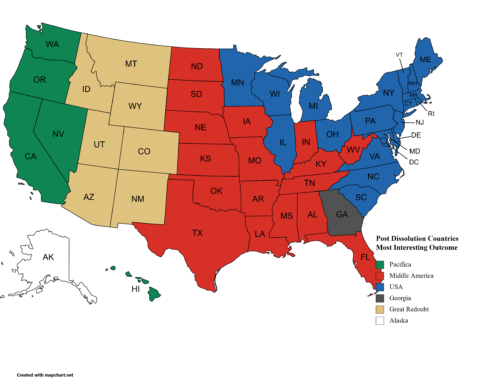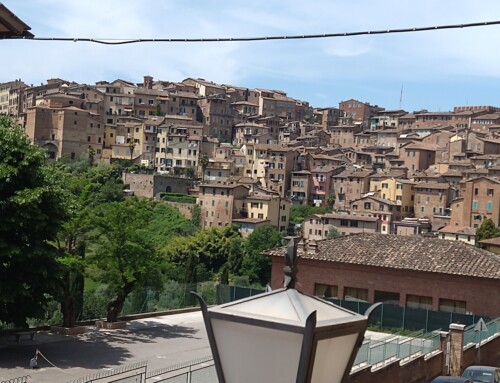It has been a difficult week for liberalism in the world. The notion that people ought to respect the election results even if it puts in power those they oppose isn’t working. The idea that cosmopolitanism – diversity and respect for other cultures – is better than everyone looking and thinking the same seems to be literally under attack in Europe.
But perhaps our liberal institutions can shield us and help us ride through the rough times. Lets see.
We were told a hundred times “Donald Trump can’t win.” Yet this week he accepts the nomination as the Republican Party’s presidential candidate. The concept of being a nation of immigrants doesn’t matter to the man. The Washington Post reports that he doesn’t read. He doesn’t need to since his gut tells him what to do.
We were told “Britain could never vote to leave the EU.” But by a 4 point margin, the people did just that even though the process is designed to make that outcome nearly impossible. Even with more than 40% of the population of London being foreign-born, and nearly all major cities voting to stay in, the countryside turned out to vote Leave.
The Swedes agonized that “Swedish culture prides itself on welcoming immigrants.” Or at least they thought so when those immigrants were European Bosnians who were Muslim in name only. Now Sweden has such a problem with its immigrant Muslim population that the once-welcoming country has closed its doors and is trying to figure out how to stop attacks on women without offending their recent arrivals who make up a significant population in Stockholm.
Turkey presently is led by an autocrat that recently built himself a 10,000 room (not a misprint) presidential palace with taxpayer money. Erdogan, who said that one of the greatest modern evils is social media, relied on that social media to defeat last weekend’s coup.
In the words of one old D.C. hand: “To make sure nobody can organize another attempt to bring down my government, I’ll fire TWELVE THOUSAND armed and trained military and police officers. That way, they’ll have no way to make a living and nothing to do all day except think about what a great leader I am and how wrong they were to oppose me. Then I’ll fire the top 3,000 legal minds in the nation, to make sure they don’t get any ideas either.” It seems to me that those lists were either drawn up awfully fast or else were already kept in a drawer in case something like this ever came up. Is it any wonder why some people see Turkey not as a stable NATO member, but as the next country for the Islamic State to call home?
And yet the West fiddles while France burns and plays Pokemon Go and is told to “trust” that everything will work out well and challenge “everyone to respect democratic institutions.”
But reality shows that Austria, France, Netherlands, Hungary, Poland, and the US are all either seeing strong right-wing challenges to their governments or have already elected them to office. And when your country’s constitution says that those with the most votes wins, then the people get what they wanted. Just search for the words “illiberal democracy” to see what is happening around the world, not just in Europe.
But lets not look down our noses at the will of the people in all these countries. For decades the people have been fed a steady diet of illiberal policies through opaque processes. Who can truly say they understand the way laws are made within their countries or within the EU? If you really do, then your country is probably doing ok.
As James Traub, of Foreign Policy, writes, liberalism (respecting or at the very least tolerating others and the decisions of elections) is in danger in Europe where the EU makes decisions through an opaque process. It’s not working in Europe where children of immigrants terrorize their countrymen. It’s not working in the US where people with little hope of meaningful employment believe that immigrants are taking all the jobs (even if the Americans wouldn’t likely work in them).
And this past week we hear President Obama say that globalization is here to stay and that the jobs lost aren’t coming back. The very issue so concerning to so many is not necessarily disregarded by elites, but those elites seem to think that the people are too insignificant to explain things to. The people just have to accept things the elites do for their own good.
Until, that is, the people decide they’ve had enough and vote for radical change. And when elites charge the people with ignorance or racism in an attempt to shame them back in their boxes, at some point that doesn’t work. People do vote. And sometimes they vote for an illiberal democrat.
A friend from DC who was often in the White House across multiple presidencies said that many Americans have, indeed, had enough of experts and elites, for three main reasons:
So perhaps our people will elect an illiberal autocrat. But we’ve had those in our history. And so have other countries. And yes, sometimes it produced a Hitler or a Mussolini or an Andrew Jackson. But that doesn’t necessarily mean war is on the horizon. Viktor Orban hasn’t invaded one of Hungary’s neighbors. Neither has Poland, and likely neither will Marine LePen if she wins in France.
Listen, I’m certainly not advocating for illiberalism. I’ve written on numerous occasions about the importance of learning about others, of traveling to new places, eating new foods, incorporating new customs. I agree with James Traub that rationalism is at stake and that some politicians are exploiting an anti-intellectual narrative by whipping up the masses against “the system.”
But at some point, the people who are told to be rational rebel against those who themselves have not owned up to the natural consequences of their policies. And in the end, the people get what they deserve. They have a right to be wrong. We just have to hope that the potential wrong brought about by the populist won’t cause some greater problems down the road than the ones that got them elected.






Hi Kim. Thanks for the comment and thoughtful questions. Lets see…
First, I’d have to look at your assumptions, namely that there is more opacity now than at some earlier point in our political process, that there is a lower level of knowledge in the polity, that social media and increased information have widened the gap between elites and common voters, and to what extent the abandonment of liberal arts has caused these phenomena.
I agree that our political process is extremely opaque. Sunlight is the greatest disinfectant and sunlight is something our process hasn’t seen in decades. The US ranks lower on the transparency/corruption scale than I would bet most self-proclaimed American Exceptionalists would accept and higher than angry leftists would accept based on the openness of our political process (see Transparency International). At #16 in the world with an overall rating of “Extensive” openness of the budget process, perhaps it isn’t as much that the process is opaque as that people generally don’t bother looking into their issues as that is more difficult than complaining.
Next, I would agree that social media and technology have given people far more options on what to watch and read than they had when your choices were three broadcast news programs and your local city’s newspaper. And with the increase in information, it is not at all surprising that people will read or watch what validates their own positions rather than what challenges it, or not read or watch any news since there is so much else in the offering. But is the chasm between elites and common voters now greater than it was at some point in the past? I’d have to see strong evidence for that and doubt it is there. Our elites have always been tremendously separated from the average person. Nuance itself is elitist as most people want simple black and white answers, not more questions to develop a more nuanced understanding of issues. I lament that, but that is and always has been a reality in our country (see Richard Hofstadter’s Anti-Intellectualism in American Life).
Finally, I really agree with you on what I think is one of the greatest causal issues in our country. The move away from liberal arts education to a standardized test education has, in my personal opinion, removed from our collective consciousness a critical thinking ability, an ability to understand the nuance in issues. While it is obvious that technology makes the world today smaller and faster than the world of even 30 years ago, I do not buy the notion that we need to abandon classical liberal arts to live with this new technology. Children and toddlers figure out the technology because it is made intuitively for people to figure out. But removing philosophy, foreign languages, shop class, gym, and classical history removes a common foundation that all people at one time had which we no longer have. Will this lack of foundation doom us as a country? No. But it does limit the number of people that can understand how certain issues are linked that they otherwise would see as unrelated. That is the importance of critical thinking.
Thanks for the website Tom. As a fan of Brett McKay, I´ll point out that Trump has all the fundamental qualities of manhood; courage, strength, competence, and honor. American men have been so feminized and brainwashed by feminism (which is a Marxist derivative), that many were compelled to shun Trump simply because he made crass comments. I believe no one can call himself a real man and have supported dishonest Hillary Clinton just because Trump was “rude;” especially since his policies are great. The Trump era is a huge blessing to our nation.
Hi Vince,
Thank you for the response and thank you for reading the web site.
Please remember that the purpose of the article was to say that although there is a move towards illiberalism in the Western world, when people have the right to vote, they have to have the right to be wrong. The Democrats put forth Clinton, as insider a candidate you can get. The Republicans put forth Trump, who in the most objective terms was an independent who took over the Republican party fair and square.
I think it is quite possible for people to think that Trump is exactly what we need to shake up the system in DC and at the same time to think that he is a huge gamble for the country. Those are not dichotomous beliefs. I will not agree or argue with you about his strength, courage, competence and honor. Now that he is the President-elect, lets see what the natural experiment of his time in office gives us as far as evidence.
If you have read my work or listened to my interviews, you will know that I have lamented the pussification of the Western Man. As a high school coach, I spent nearly as much time this past season talking to the boys about manhood and AoM as I did tactics. However, honor as Brett and Kate wrote in their earliest series on classical manly honor, you’d have to say that the President-elect is lacking in many of these areas. But that doesn’t disqualify him outright. His selection of James Mattis shows something that his detractors didn’t think he had in him. I think many of his cabinet selections will be likewise.
In closing, I go back to the point I made in the original article…When people have the right to vote, they have the right to be wrong and if they are, they have to live with the consequences. That’s the beauty of our system. I pray for him and that he turns out to be what we need. I also pray we are resilient enough to bounce back if he isn’t. If you read my piece from last week, you’ll see that according to historical cycles and our current trajectory, we are in for a historical “turning.” Our President-elect will either hasten that turning or hold it off. No in-between.
Keep reading…
[…] We wrote in the summer of 2016 that liberal democracy, meaning the form of government where people a… on all sides. In that article we said that the people had the right to be wrong, but that they would then have to live with consequences of their decisions. In the fall of 2016 we wrote about people moving apart politically and socially and being unwilling to open themselves to ideas and discussions from those with opposite points of view. […]